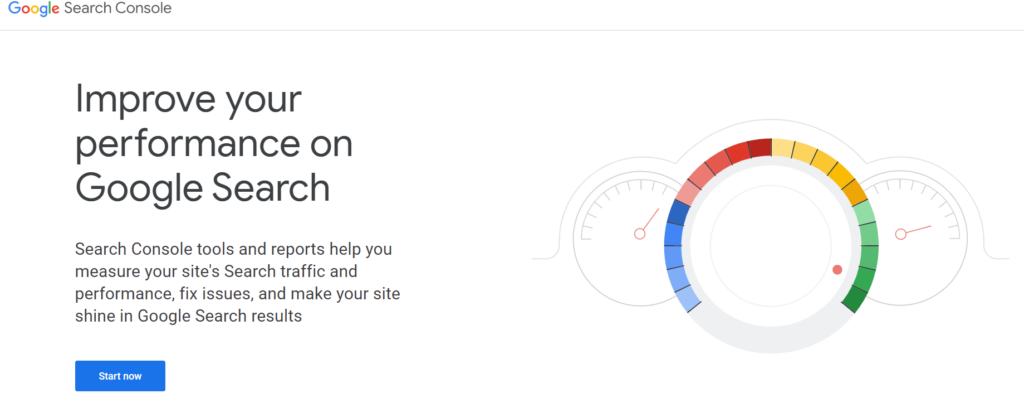Search engine optimization – better known as SEO – is a subset of digital marketing.
It’s a set of strategies and techniques that help make your website more likely to show up on the first page of Google search results.
A good SEO strategy means you’re likely to show up at the top of the page when people search for something like “forklift rentals in Dallas” or “excavator rentals near me” – things that hundreds or even thousands of people search for every day.
If you’re the one that comes up at the top of those searches, then those customers are probably going to end up buying from you.
If you don’t have an SEO strategy in place, you’re missing out on a lot of sales – sales that may well be going to your competitors instead.
SEO can seem daunting at first, but it doesn’t have to be.
We’ve created a beginner’s guide that breaks down SEO for equipment rental companies step by step, showing you how to get started and build the solid foundation you need for SEO success.
If you’re running an equipment rental business and new to SEO, here’s what you need to know.
Want to make more sales? Your business needs an SEO strategy
Someone needs to rent a piece of equipment – heavy machinery, a kayak for a weekend trip, or anything in between.
What’s the first thing they do?
They pull up Google and search.
They might look for something like “backhoe rentals near me,” or “backhoe rentals in Philadelphia.” (There are several common query structures that customers use – check out our post on the top cities for equipment rental searches for some more info on exactly what people tend to search for.)
Chances are, they’ll end up going with a company that shows up at the top of the Google search engine results page (SERPs).
So if your competitors are optimizing for Google search, but you’re not, you’re losing out on a big chunk of potential business.
For equipment rental companies, search engine optimization (SEO) is a key source of leads and bookings. Being able to rank on the first page for relevant searches can make a huge difference for your business’s growth and success.
So how do you show up for the right searches? You need a solid SEO strategy.
How is local SEO different?
Equipment rental companies are businesses that serve a particular geographic area, rather than catering to customers nationwide or internationally.
As such, you’ll need to focus on what’s known as “local SEO.” This is a subset of search engine optimization that centers on tactics and strategies that work for local businesses.
There are some additional tools and considerations that are specific to local SEO (versus national or international SEO). The right strategies will help your business rank for local searches, targeted specifically toward people in your geographic area – things like “forklift rentals near me.”
For these kinds of local searches, Google’s search algorithms take some additional factors into account – namely, Distance, Relevance, and Prominence.
- “Distance” concerns how close the searcher is to your business’s location. The closer they are to your address, the more likely you are to come up in their searches.
- “Relevance” is pretty self-explanatory – Google shows people results that sync up with what their queries indicate that they’re looking for.
- “Prominence” concerns factors like the quantity and quality of your reviews, as well as the amount of engagement your brand is getting online.
Creating an Equipment Rental SEO Strategy: What You’ll Need to Do
SEO is a long game. While you won’t see results overnight – in most cases, it’s a matter of months before you really start to see clear gains – SEO can bring a lot of long term growth.
To get started with an SEO initiative, you’ll need to cover some groundwork first and lay the foundation for success.
Here’s what you’ll need to do to get started with SEO for your equipment rental business:
-
Claim and optimize your Google My Business page
-
Set up Google Search Console (GSC)
-
Perform keyword research
-
Optimize your website for your primary location
-
Optimize your site for technical SEO factors
-
Create optimized categories
-
List your company on relevant online directories
-
Encourage your customers to leave reviews
-
Develop a content marketing strategy
-
Build backlinks – links to your site from other websites
Here’s a step by step guide for what you’ll need to do to set your SEO strategy in motion.
Claim and Optimize Your Google Business Profile
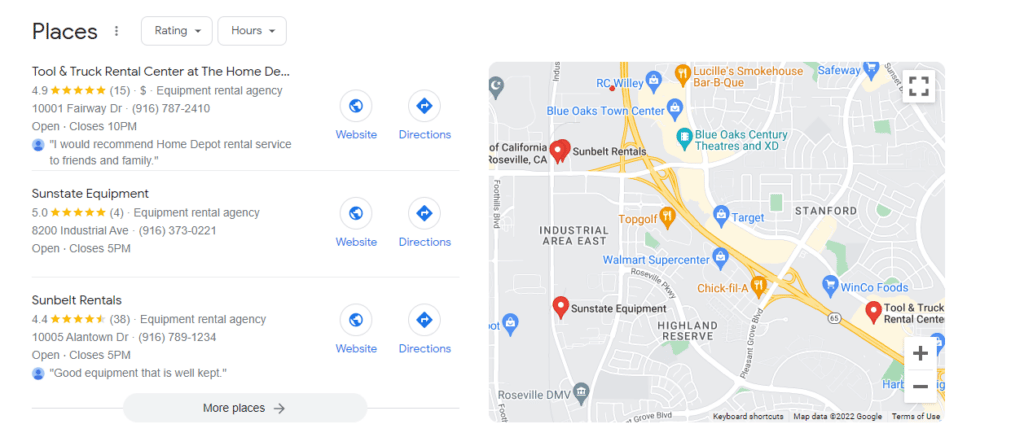
Google Business Profiles are an essential part of local SEO. For local searches, the algorithms draw heavily from information about businesses that’s contained on these pages.
This feature has been around for over fifteen years, under several names. Up until quite recently, it was known as “Google My Business” – usually abbreviated as “GMB.”
In 2021, Google changed the name to “Google Business Profiles.” However, the abbreviation GMB is still in standard use throughout the SEO industry.
In this article, we’ll be referring to Google Business Profiles as “GMB” for short.
One of the first things you’ll need to do is to create your GMB listing, and ensure that it’s optimized properly.
The first thing you should do is to run a Google search for your business, to just to make sure it doesn’t already have one. (If it does, but you’re not in possession of it, you can claim the profile.)
If you don’t have one yet, setting it up is a pretty simple process.
After you enter your information, Google will need to verify your profile. This involves sending a postcard to your physical address, and usually happens within one business week.
Some of the information you’ll need to input includes:
-
Your official business name
-
Your business category
-
Your address and phone number
-
Your business hours
-
Your website URL
-
Information about your service area
Optimizing your Google Business Profile
You’ll want to include relevant SEO keywords in your GMB profile, as you would on your website.
You also need to ensure that all of your business information is accurate. One of the biggest factors in local SEO is what’s known as “NAP consistency.” NAP stands for “name, address, phone number.” These need to match across various platforms — GMB, your website, online directories, etc.
Post to GMB Periodically
Google Business Profiles allow you to create posts on the platform. Posting to your GMB profile helps maintain an active presence on Google, as well as giving you an additional place to engage directly with your customer base.
You can post things like discounts and offers; new products; upcoming sales and other events; and general info and updates about your business.
To get some more info about how to post to GMB, we recommend Search Engine Journal’s excellent guide to Google Business Profiles.
Set up Google Search Console
If you want to execute a successful SEO strategy, you need to be able to track results – search rankings, traffic analytics, and other important metrics.
Google Search Console – formerly known as Google Webmaster Tools – is a key weapon in your SEO arsenal. It’s a free platform that lets you monitor how your site is performing.
With GSC, you can see information like referring domains, desktop and mobile site performance, whether you’re featured in rich search results like Featured Snippets, and more.
GSC is a robust tool, with a lot of different features. It can take some time to get the hang of using it, but once you do, you’ll swear by it.
Setting up Google Search Console
First, you’ll need to add your website to GSC.
Here’s what you need to do.
-
Sign into your business’s Google account.
-
Go to Google Search Console.
-
Click the “Add a Property” button.
-
Select “Website” from the drop-down menu.
-
Enter your site’s exact URL.
-
Hit “continue.”
-
Pick a verification method.
Because GSC gives you access to confidential information, you’ll need to prove that you own the website. There are several verification options to choose from.
Once your site is verified, you’ll be able to see data for it.
For more info on how to use GSC effectively, check out Hubspot’s in-depth guide.
Perform keyword research to find the best search queries to target
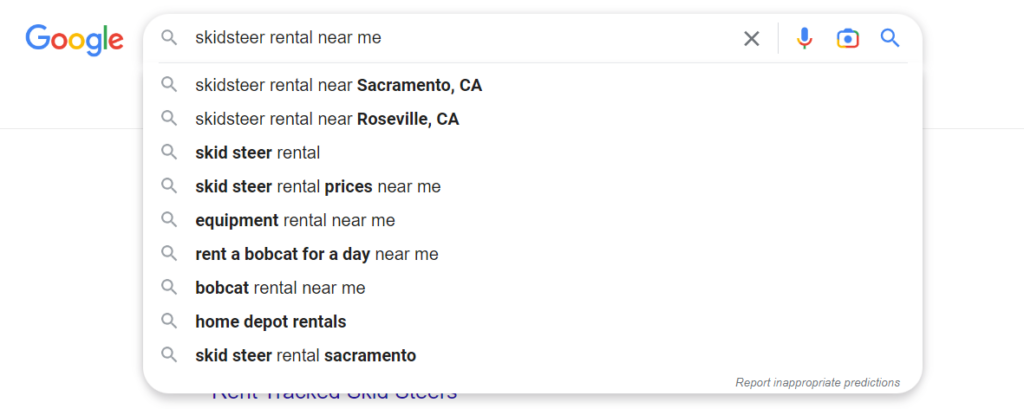
SEO revolves heavily around keywords – that is, the queries that users type into Google when they search.
Keyword research is the process of finding out exactly what people search for, when they’re looking for the kinds of products you offer – in this case, equipment rentals.
So where do you find keywords?
One place to find them is Google Keyword Planner, Google’s own tool for keyword research. It’s free to use, but there’s a caveat: the data it gives doesn’t tend to be very accurate. You’ll end up seeing search volume ranges along the lines of “100-1000,” or “1000-10,000.”
If you want data that’s far more accurate, third party SEO tools are the way to go. There are a bunch of different tools on the market to choose from, with some of the most popular being SEMRush, Ahrefs, and, for local SEO, BrightLocal.
The idea is to find keywords that people would search for if they’re looking for something that you can offer them.
For example, if you’re a heavy construction equipment rental company based in El Paso, Texas, you’d want to optimize for queries like “forklift rental in El Paso.”
How to search for keywords
There are a couple of different methods you can use to find suitable keywords you can optimize for.
Brainstorm “seed” keywords, then search them to find other related keywords. For example, you might start with something like “kayak rentals.”
Check what your competitors are optimizing for. SEO software lets you snoop on what your direct competitors are optimizing their own pages for. This is a great way to get some info on the best keywords to target.
When you find keywords, you’ll be able to get data for them. This includes information like search volume – how many people are searching for that query each month. You can also look at the existing SERPs for a particular keyword.
Most SEO software will also assign a Keyword Difficulty Score. While these are a third party metric (rather than being directly involved in Google’s algorithms), they can give you a general idea of how hard it will be to rank.
For a thorough guide to keyword research strategies and best practices, we recommend this comprehensive guide from Ahrefs.
Optimize your site for your primary location
Because you’re a localized business that serves a specific geographic area, you’ll need to optimize your site for your primary location, as well as for relevant keywords.
You’ll need to use your location in key places on your site – headings, URLs, page titles, body copy, and the like. Just as you would do with your target keywords.
Create compelling, original product descriptions optimized for search
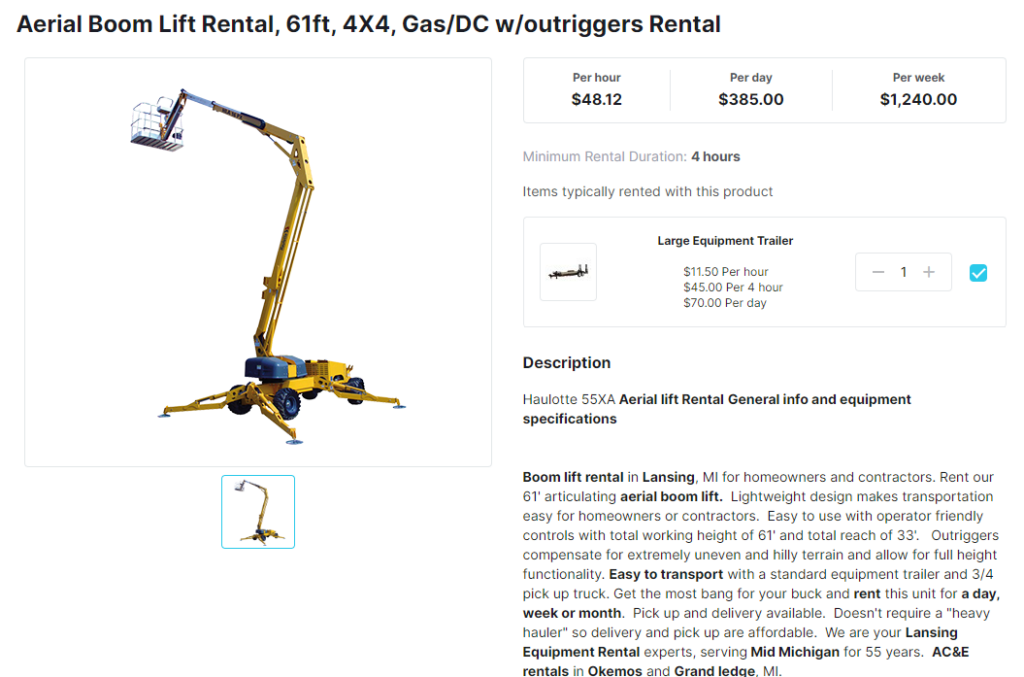
Each item you’ve got available to rent should have its own unique product description. You can easily optimize these descriptions for SEO, including relevant keywords for which you want the page to rank.
Your product descriptions should, of course, be written for humans rather than for search algorithms. They should describe the products thoroughly, and the copy should be well-written enough to compel someone to book a rental.
Product descriptions tend to be pretty concise and to-the-point. As such, you want to make sure to avoid using your keywords too many times, which can actually work against you.
Some of the key places to include your target keywords include:
-
The URL of the product listing page
-
The page title
-
The main body copy for the product description
-
Alt tags for the product images featured on the page
Create optimized category pages
Category pages are an important part of any ecommerce site. They divide your products up into subsections by type, making it easier for your customers to browse and find what they’re looking for.
They’re also great for SEO. With the right strategy, you can bring in organic search traffic to these pages. To do this, you’ll need to add substantial text to the page, which is optimized for your target keywords.
For a more detailed discussion of how to rank a category page, we recommend this blog post from Search Engine Journal.
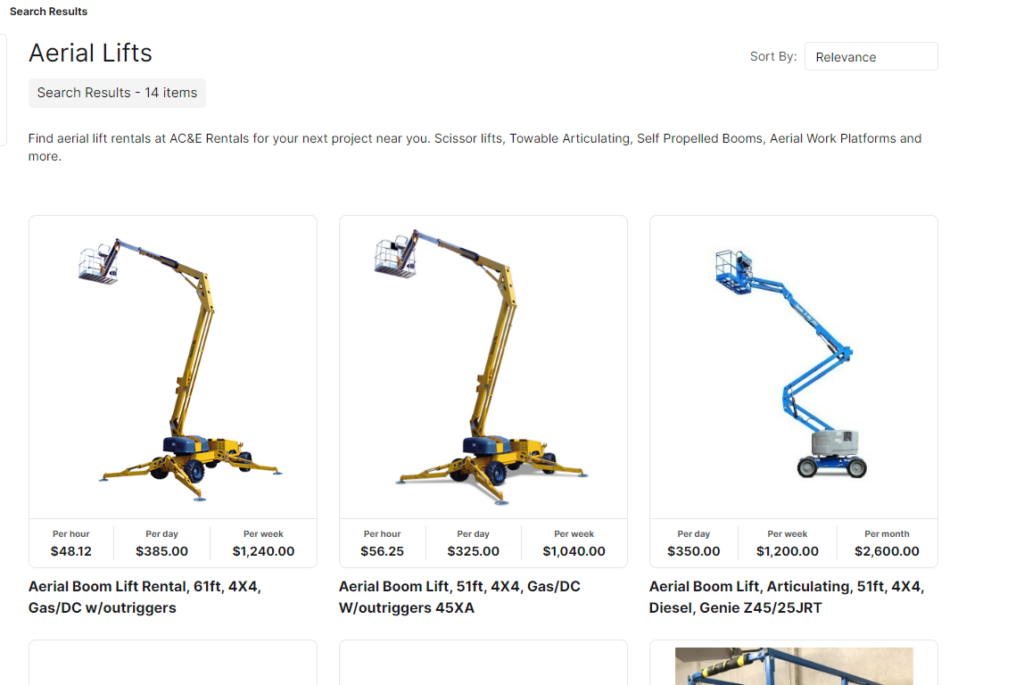
Create citations by listing your company in relevant online directories and websites
“Citations” are online references to your business that contain your company’s name, address, and phone number (“NAP data”).
There are several different platforms online that host citations. Along with Google Business Profiles, there are also such well-known options as Yelp, Angie’s List, and Facebook.
You’ll also find other, smaller online directories that are a good place to get a citation.
These citations are a key factor in the off-page aspect of local SEO. When your business is listed in trusted online directories, that sends Google a signal that your business is worth showing to potential customers.
It also offers you other opportunities to come up on Page 1 of relevant Google searches, beyond just ranking your own website.
Some queries tend to be dominated not by individual business’s sites, but by directories and aggregation sites like Yelp or YellowPages. Having a presence on these platforms can help get you in front of searchers, even if your own site isn’t on the first page.
Because citations are so important, it’s worth investing in software tools that help you with citation management. One of the most popular options is BrightLocal.
How to optimize your citations
When you create citations, you’ll want to optimize them, making sure that you include key information.NAP data. We’ve mentioned that it’s important for your business’s name, address, and phone number to be consistent across different websites and platforms.
Business description. These are a good place to include some of your core keywords.
Website link. Obviously, you’ll want to include a link to your website.
Category. On sites that let you select a category, you’ll want to make sure you choose one that’s accurate.For example, if someone wants to rent a forklift, they might look for something like “best forklift models.”
Some of the styles of content you can create, centered around relevant SEO keywords, can include:
-
- How-to guides and tutorials
- Product reviews and comparisons
- Industry news
- Interviews with industry experts
- Once you create content and publish it on your site, you can also promote it to your audience on social media.
Build backlinks to your website
Other than citations and GMB, most of what we’ve discussed so far in this article concerns what you would call “on-page SEO.”
Things like optimizing your pages for keywords are just one part of the SEO equation.
The other component is known as “off-page SEO.” Here, backlinks play a central role.
A backlink is a link to your site from someone else’s website. Ever since Google’s inception, backlinks have played a major role in the company’s search algorithms. Taking links into account is how Google beat out the competition back in the early 2000s.
To thrive in the SERPs and get that coveted organic traffic, you’ll need for other websites to link to yours.
How to get backlinks
So, how do you get backlinks?
This is an age-old question in the SEO world, and one for which there isn’t really any one, straightforward, simple answer.
In the early days of Google, there were many schemes and shortcuts that SEOs used to get links – links they essentially created themselves.
But in 2022, these strategies are very much a thing of the past. There’s no way around it: getting backlinks is one of the most challenging parts of SEO.
You need links from reputable websites – links that make sense in context, and aren’t obviously there as little more than an SEO ploy.
Here are a few of the common ways to get quality links:
- Check out your direct competitors’ backlinks to get ideas. One of the best places to start with a link building strategy is to see what your competition is doing. You can easily use tools like Ahrefs and SEMRush to snoop on your competitors’ backlinks, finding out exactly where they’re coming from. You can then emulate their strategy, and seek out the same kinds of links.
- Directories: We mentioned the importance of citations earlier in the post. Links from reputable online directories are a great way to boost your off-page SEO for a local rental business.
- Local press. If you have something interesting or newsworthy going on, you can put out press releases, or reach out directly to local journalists. Getting some press is one of the very best ways to get high quality backlinks that move the SEO needle. It’s also great for general PR.
- Guest posting. Guest posting is where you write and publish a blog post on someone else’s website. For these to be effective, they need to have value for the other website’s audience. You’re sharing your insights and expertise. If you’re interested in guest posting, you can reach out to the owners of other sites whose audience overlaps significantly with your own.
- Local sponsorships and scholarships. One way to get some quality links is to offer a small college scholarship for local students, or to otherwise offer some kind of sponsorship.
These are a few of the ways to get good links for your business’s website.
Set yourself up for SEO success by putting the right foundation in place
When people want to rent a piece of equipment, the first thing they usually do is Google it. This means that if you’re not showing up in Google searches, you’re missing out on a lot of valuable business.
A strong SEO strategy can make a huge difference for your business’s growth and success, bringing in more leads and getting you more bookings than ever before.
Once you’ve got the right foundation in place, you can continue to develop your SEO strategy over the long term, bringing consistent growth over years to come.
SEO is a complex undertaking, with a lot of moving pieces, and a lot of information to learn. When you’re running a rental business, you don’t always have time to handle all of that yourself.
At Quipli, we offer expert digital growth services for equipment rental businesses like yours, including SEO.
Our team of search engine marketing experts have experience and expertise in marketing for the rental industry.
We create powerful SEO strategies that bring results, managing your SEO for you so that you can focus on running your business.
Reach out any time to find out more about our SEO and digital marketing services, and start growing your business today.
Helpful SEO Guides and Resources
-
Local SEO Ranking Factors: https://www.searchenginejournal.com/ranking-factors/relevance-distance-prominence/
-
Google Business Profiles: https://www.searchenginejournal.com/local-seo/optimize-google-my-business/
-
Google Search Console: https://blog.hubspot.com/marketing/google-search-console
-
Keyword research: https://ahrefs.com/blog/keyword-research/#keyword-research-basics
-
Best keywords for equipment rental: https://quipli.com/the-top-cities-for-equipment-rental-search/
-
Optimizing product category pages: https://www.searchenginejournal.com/optimize-category-pages-informational-copy/392035/
-
Citation management: https://www.searchenginejournal.com/citations-local-seo-guide/347380/
-
Review management: https://databox.com/how-to-encourage-customers-to-write-reviews#process
-
Content marketing: https://optinmonster.com/content-marketing-guide/#strategy
-
Link building: https://respona.com/blog/local-link-building/
Quipli Is Improving the Construction Equipment Rental Experience
Just because owning and maintaining construction equipment is expensive doesn’t mean renting it has to be. Quipli simplifies the equipment rental process. Our equipment rental software embeds easily into any website, allowing customers to enjoy a smooth rental experience without the traditional headaches.
Interested in additional marketing ideas for equipment rental or information on paid ads for equipment rentals? Contact Quipli today!

